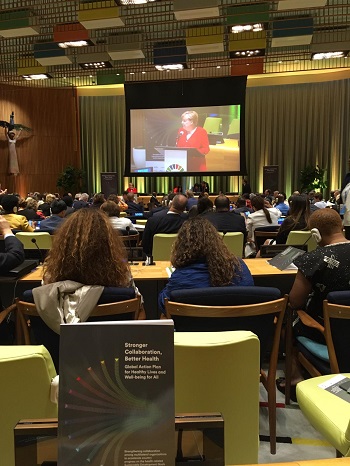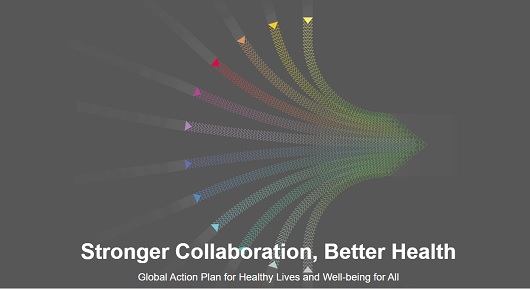Global Action Plan for Healthy Lives is launched by the UN
04/10/2019
Julia Dias
 Twelve multilateral agencies launched on October 24 a joint plan to support governments to accelerate the fulfilment of the health targets of the Sustainable Development Goals (SDG) during the next 10 years. The plan was launched at an event at the UN headquarters in New York, during the 74th General Assembly, with the presence of the First Ministers of Germany, Angela Merkel, and of Norway, Erna Solberg, of the President of Gana, Nana Akufo-Addo, and of the directors of the twelve agencies.
Twelve multilateral agencies launched on October 24 a joint plan to support governments to accelerate the fulfilment of the health targets of the Sustainable Development Goals (SDG) during the next 10 years. The plan was launched at an event at the UN headquarters in New York, during the 74th General Assembly, with the presence of the First Ministers of Germany, Angela Merkel, and of Norway, Erna Solberg, of the President of Gana, Nana Akufo-Addo, and of the directors of the twelve agencies.
Developed in the past 18 months, with the collaboration of] Fiocruz, the Global Action Plan for Healthy Lives and Well-Being for All starts with the acknowledgement that if things continue at the current speed, the 2030 Goals for health, included in the SDG, will not be fulfilled.
“The plan is called ‘Stronger collaboration, better health’ for a reason,” said the Director-General of the World Health Organization (WHO), Tedros Adhanom Ghebreyesus. “Although collaboration is the way, impact is our destination. The launching of this plan is the beginning, not the end, of this road”.
The document consists of seven accelerating themes, representing common challenges and recommendations. They are: Primary health care; sustainable financing for health; community and civil society engagement; determinants of health; Innovative programming in fragile and vulnerable settings and for disease outbreak responses; Research and Development, Innovation and Access; Data and digital health.
“This plan has a very important role in strengthening the commitment between countries and all the international agencies that helped write it”, stated Fiocruz president, Nísia Trindade Lima, who participated in the process of writing of the document as a member of the accelerator advisory group on Research and development, innovation and access.

“We hope to contribute by drawing attention to the role of science and technology to increase the reach of the SDG, not only the SDG 3, which is our main goal, but all its related ones. In the specific case of the SDG 3, we draw attention to the lack of symmetry on innovation between different countries and to the importance of carefully looking at these inequalities between regions and between nations, so as to leave nobody behind. In addition, we must also stimulate the preservation of achievements, such as the Public Health System (SUS, in the Portuguese acronym) in Brazil, with its component of innovation and public production of health inputs with the goal of providing access to the population”, she explained.
Together, the twelve agencies responsible for drawing up the plan contribute with about one third of the entire global health assistance. Coordinated by WHO, they developed the plan as a response to a request placed by Germany, Gana and Norway, with the support of the UN Secretary-General, Antonio Guterres, for a more effective collaboration and coordination between the health organizations in order to achieve the goals of the 2030 Agenda.
Through this document, they reaffirm their commitment in helping governments to identify priorities, plan strategies and implement actions. In addition, the agencies intend to align their operational strategies to increase the efficiency of their financing and reduce the weight on countries, and commit to helping in the processes and in result evaluation.
The twelve agencies responsible for the plan are: the Vaccine Alliance (Gavi), UN Women, World Bank, World Food Programme (WFP), United Nations Children’s Fund (UNICEF), United Nations Population Fund (UNFPA), Joint United Nations Programme on HIV/AIDS (UNAIDS), Global Financing Facility for Women, Children and Adolescents (GFF), the Global Fund to Fight AIDS, Tuberculosis and Malaria (Global Fund), United Nations Development Fund (UNDP), Unitaid and WHO.


